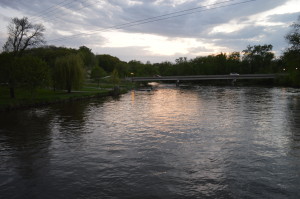
The Iowa Supreme Court issued a ruling Jan. 27, 2017, on the Des Moines Water Works lawsuit.
(photo/Cindy Hadish)
Agricultural interests cheered a court ruling that sided with drainage districts in a lawsuit filed over nitrates that flow into drinking water of half a million residents in the Des Moines area.
The Iowa Supreme Court ruling was issued today on four certified questions of law that the Court received from the U.S. District Court for the Northern District of Iowa, which is hearing the full case.
Des Moines Water Works’ board filed the lawsuit in 2015 against upstream drainage districts in Sac, Calhoun and Buena Vista counties, over the costs of removing nitrates that flow into the Raccoon River, which provides drinking water for 500,000 Iowans.
Drainage districts in Iowa allow wetlands to be turned into farmland; Iowa law has provided immunity to drainage districts from damage claims for more than a century.
The court upheld that precedent in the Jan. 27, 2017, ruling.
Over one of the questions of law, the court noted that generally, one subdivision of state
government cannot sue another subdivision of state government. “And even if they could, an increased need to treat nitrates drawn from river water to meet standards for kitchen tap water would not amount to a constitutional violation.”
Iowa Secretary of Agriculture, Bill Northey, called the decision a significant loss for Des Moines Water Works.
“Their failed strategy seeks to circumvent well-established Iowa law with more than 100 years of precedent,” Northey said in a statement. “Unfortunately, it has already cost Des Moines Water Works ratepayers more than $1 million dollars on lawyer fees that could be better spent improving their infrastructure and serving their customers. While Iowans have continued to take on the challenge of improving water quality and investing in additional conservation practices, the lawsuit has been a needless distraction from our collaborative, research-based approach that is working with Iowans in rural and urban areas across the state to improve water quality.”
Des Moines Water Works noted earlier this month that legislators continue to grapple “with the complex and costly issues associated with improving Iowa’s water quality,” and committed to being a part of the solution, unveiled its top legislative priorities aimed at restoring and protecting source water quality in the Raccoon River Watershed.
See today’s full Iowa Supreme Court ruling.

No Comments Yet